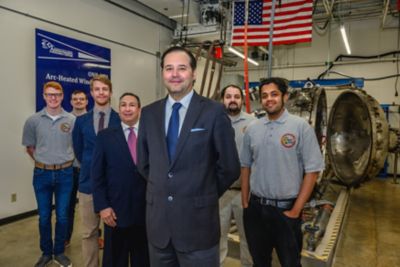Tools for Research
Ansys provides resources to help researchers. Our tutorial examples, videos and courses make it easy to learn how to use Ansys simulation and Granta materials tools.
Ansys empowers the next generation of engineers
Students get free access to world-class simulation software.
Design your future
Connect with Ansys to explore how simulation can power your next breakthrough.
Students get free access to world-class simulation software.
Connect with Ansys to explore how simulation can power your next breakthrough.
Ansys empowers you with the research simulation software you need to succeed, whether you are publishing a paper, completing a project, advancing an idea or solving a problem.
Why Use Ansys?
Simulation adoption continues to grow across industries and engineering departments, transforming product development and optimization workflows. On college campuses, many of the world’s problems are solved, our greatest companies are founded, and our brightest minds are shaped.
Ansys helps companies and researchers to solve the unsolvable. We offer low-cost, multiphysics bundles with our industry-leading software, as well as Ansys Granta materials products, to take your research work to the next level. Knowledge and research experience with Ansys simulation tools make you more attractive to leading employers, helping you achieve greater success in your career.

Ansys academic products' industry-leading simulation technology, bundled by physics area. Our research products are designed with researchers in mind. Product bundles are packaged by physics area to support your needs and include high performance computing (HPC), with the ability to add more. Universities can benefit from our multiphysics campus-wide solutions built for larger scale deployment, addressing both teaching and research needs across departments.
Learn More Product Feature TableTools for Research
Ansys provides resources to help researchers. Our tutorial examples, videos and courses make it easy to learn how to use Ansys simulation and Granta materials tools.
A Computational Investigation of Multi-row Interaction on Embedded Rotors
An important topic in the gas turbine industry is blade aeromechanics, which can lead to engine failure. GUIde Consortium launched a project to better understand the underlying physics of multi-row interactions in gas turbine compressors. The Aeroelasticity Research Group at Duke University investigated this phenomenon computationally, in conjunction with physical testing at the Zucrow Labs at Purdue University. The research involved high-fidelity 3D time domain computational simulations using Ansys CFX and a few in-house codes.

If you're facing engineering challenges, our team is here to assist. With a wealth of experience and a commitment to innovation, we invite you to reach out to us. Let's collaborate to turn your engineering obstacles into opportunities for growth and success. Contact us today to start the conversation.


